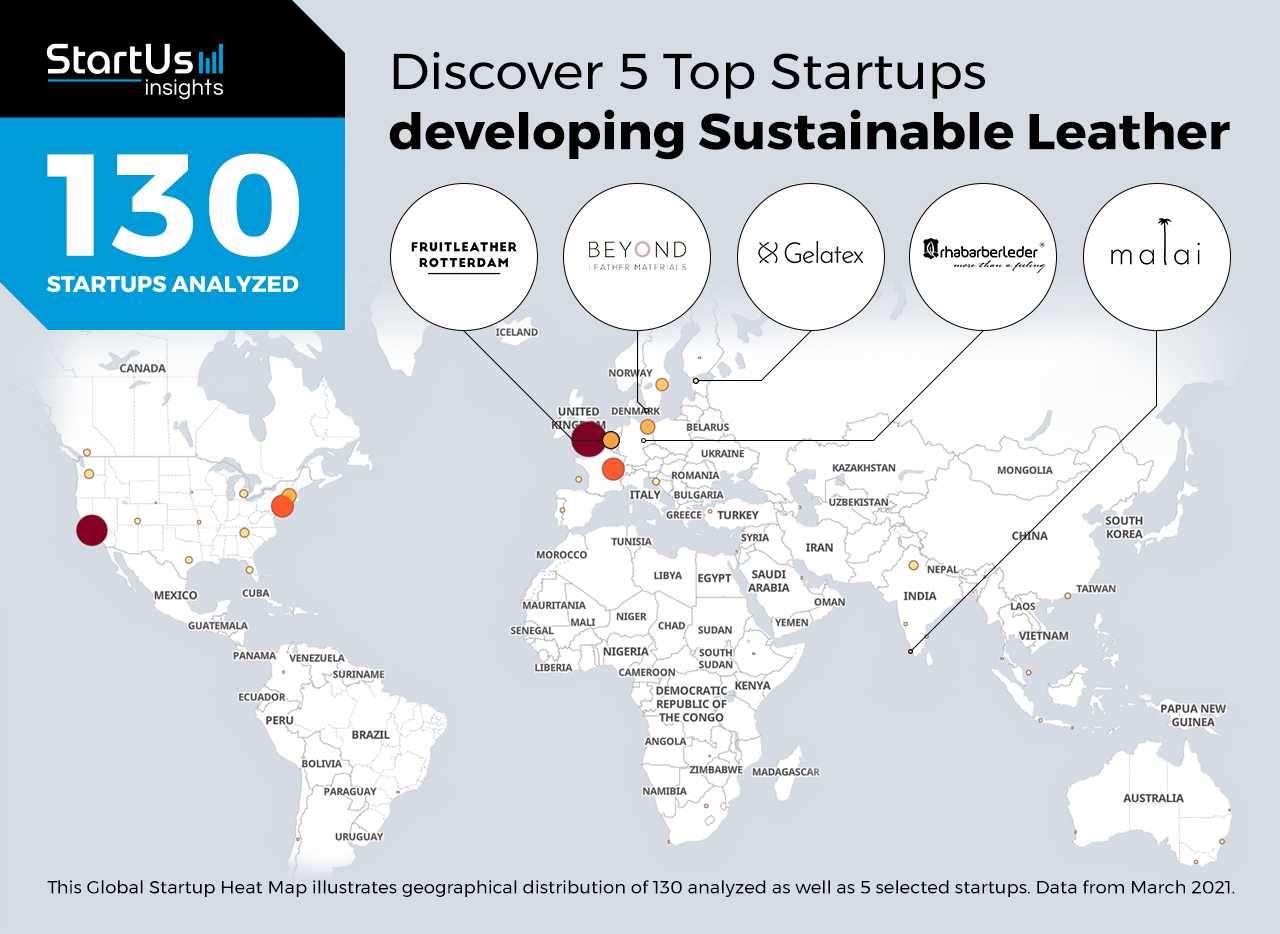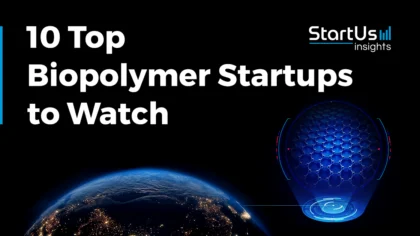Accelerate Productivity in 2025
Reignite Growth Despite the Global Slowdown
Staying ahead of the technology curve means strengthening your competitive advantage. That is why we give you data-driven innovation insights into the materials industry. This time, you get to discover 5 hand-picked startups developing sustainable leather.
Global Startup Heat Map highlights 5 Top Sustainable Leather Startups out of 130
The insights of this data-driven analysis are derived from the Big Data & Artificial Intelligence-powered StartUs Insights Discovery Platform, covering 1.379.000+ startups & scaleups globally. The platform gives you an exhaustive overview of emerging technologies & relevant startups within a specific field in just a few clicks.
The Global Startup Heat Map below reveals the distribution of the 130 exemplary startups & scaleups we analyzed for this research. Further, it highlights 5 materials startups that we hand-picked based on criteria such as founding year, location, funding raised, and more. You get to explore the solutions of these 5 startups & scaleups in this report. For insights on the other 125 sustainable leather startups, get in touch.
Gelatex manufactures Gelatin Nanofiber Textiles
The leather industry is a large contributor to greenhouse gas (GHG) emissions and global waste generation. Current methods to meet the increasing demand for leather require raising more livestock which further exacerbates the environmental challenges. Startups develop bio-based alternatives to create textiles that have similar or superior characteristics to livestock-based leather.
German startup Gelatex specializes in nanofibrous materials and nanofiber production. The startup’s proprietary production technology uses livestock waste to create gelatin and then spin it into nanofibers. By meshing the nanofibers together, it creates leather-like textiles that are lightweight, breathable, and cost-effective. The startup’s solution provides industries an eco-friendly alternative to leather while upcycling livestock waste.
Beyond Leather develops Apple Cider-based Leather
The effective recycling of waste byproducts from industrial production processes remains a challenge. Biomass feedstocks, on the contrary, are easier to recycle due to their potential use as fertilizers or animal feeds. However, the low nutritional content of organic waste presents a limitation. To solve this, emerging solutions mix the organic waste with other organic materials to create leather alternatives, expanding the applications of organic waste beyond agriculture.
Danish startup Beyond Leather creates a plant-based leather alternative from apple cider waste. The production process uses left-over apple pulp to create apple juice or cider. The apple pulp is then mixed with other sustainably-sourced ingredients to produce plastic-free leather that looks and feels like regular leather.
Fruitleather Rotterdam produces Vegan Leather
Food waste is a significant problem globally, with an estimated one-third of all food generated annually going waste. Large quantities of food waste due to fruits and vegetables not being harvested since farmers are often unable to meet high-quality standards. The utilization of very specific fruits to create alternatives help to solve a small part of the problem. Startups are researching and developing alternative materials made from a wide range of food waste, including leather.
Dutch startup Fruitleather Rotterdam produces vegan leather from food waste. The startup’s main product is a leather-like sheet created from left-over fruits and additives from natural sources. The leather alternative is a viable replacement for animal-based leather. It finds applications in footwear and fashion accessories as well as in the interior and furnishing industries.
Malai creates a Biocomposite Leather Alternative
The manufacturing of sustainable textiles has a few challenges to overcome before it becomes a viable replacement for traditional leather. To have more industries adopt leather alternatives, the product needs to be low-cost and require limited technological processing. Startups are developing production methods to maximize the cost to quality ratio of alternative leather.
Indian startup Malai uses agricultural waste generated by the coconut industry to create bio-based materials. Malai is a biocomposite leather alternative made from organic and sustainable bacterial cellulose, grown on coconut agricultural waste. It is highly durable, water-resistant, flexible, and feels similar to conventional leather. The use of bacteria and agricultural waste allows the production process to be low-cost.
Deepmello Leather develops a Leather Tanning Extract
The use of chemicals in the process of tanning also contributes to the negative environmental impacts in leather production. Mineral tanning with materials such as chromium is a popular method. However, the use of acids and salts requires the processes to be strictly monitored and managed to prevent ecological disasters. Startups develop vegetable-based tanning solutions that negate the drawbacks of chemical-based tanning while maintaining the quality and design of leather.
German startup Deepmello provides a rhubarb-based leather tanning extract as a replacement for chromium-based tanning. The leather made using the startup’s tanning extract is breathable, durable, and gives off a special fragrance. It finds applications in interiors and furnishings for automotive and yachts, clothing, accessories, high-end fashion, and more.
Discover more Materials Startups
Materials startups such as the examples highlighted in this report focus on nanotechnology, composites, as well as surface engineering While all of these technologies play a major role in advancing the materials sector, they only represent the tip of the iceberg. To explore more materials technologies, simply get in touch to let us look into your areas of interest. For a more general overview, you can download our free Materials Innovation Report to save your time and improve strategic decision-making.



![10 Top Startups Advancing Machine Learning for Materials Science [2025]](https://www.startus-insights.com/wp-content/uploads/2025/06/Machine-Learning-for-Materials-Science-SharedImg-StartUs-Insights-noresize-420x236.webp)
![10 Emerging AI Solutions for Material Science [2025]](https://www.startus-insights.com/wp-content/uploads/2025/06/AI-Solutions-for-Material-Science-SharedImg-StartUs-Insights-noresize-420x236.webp)



